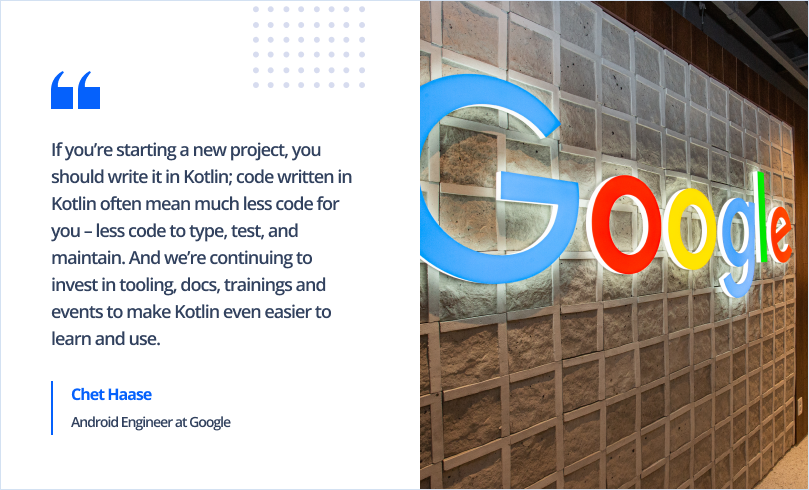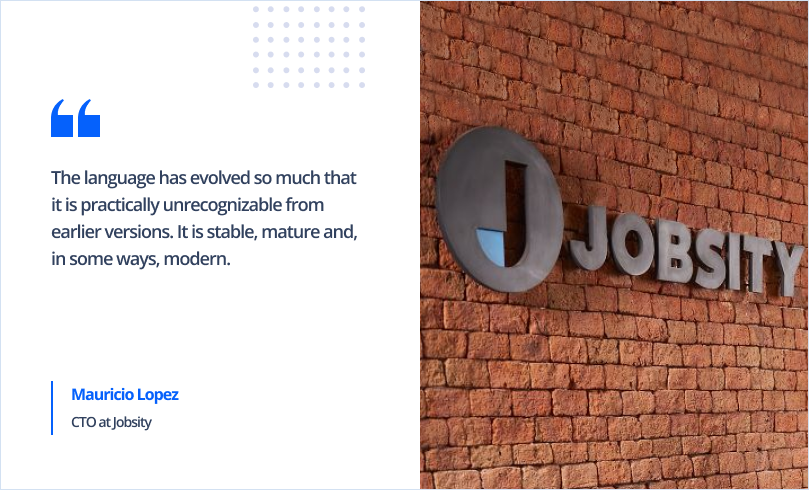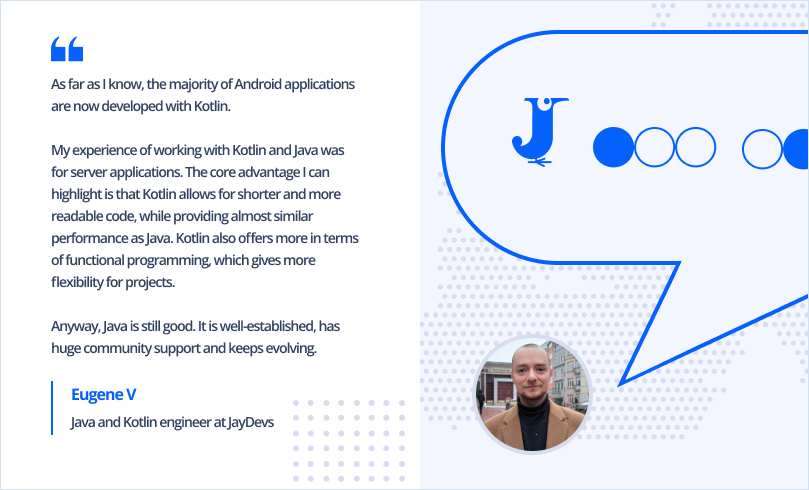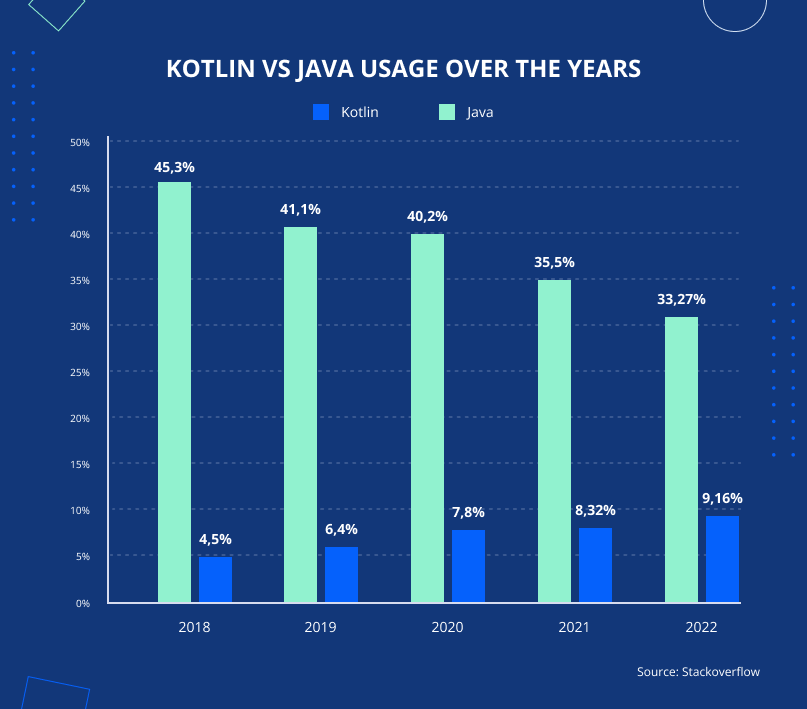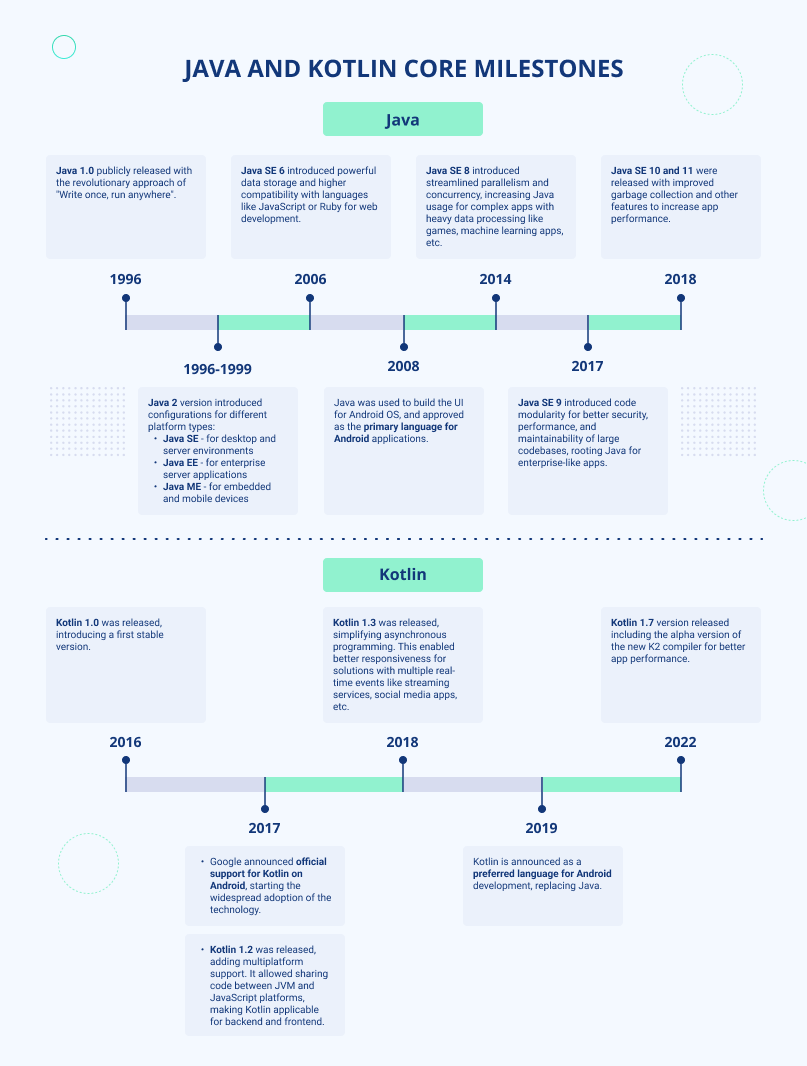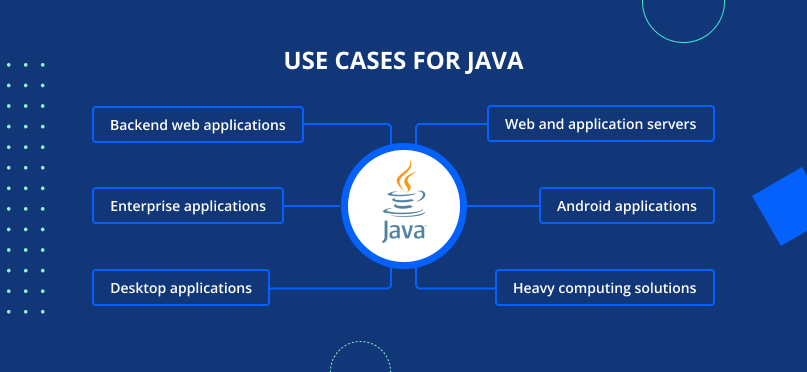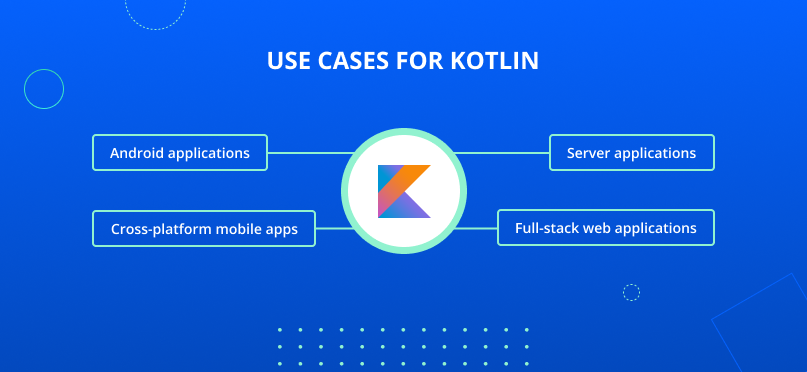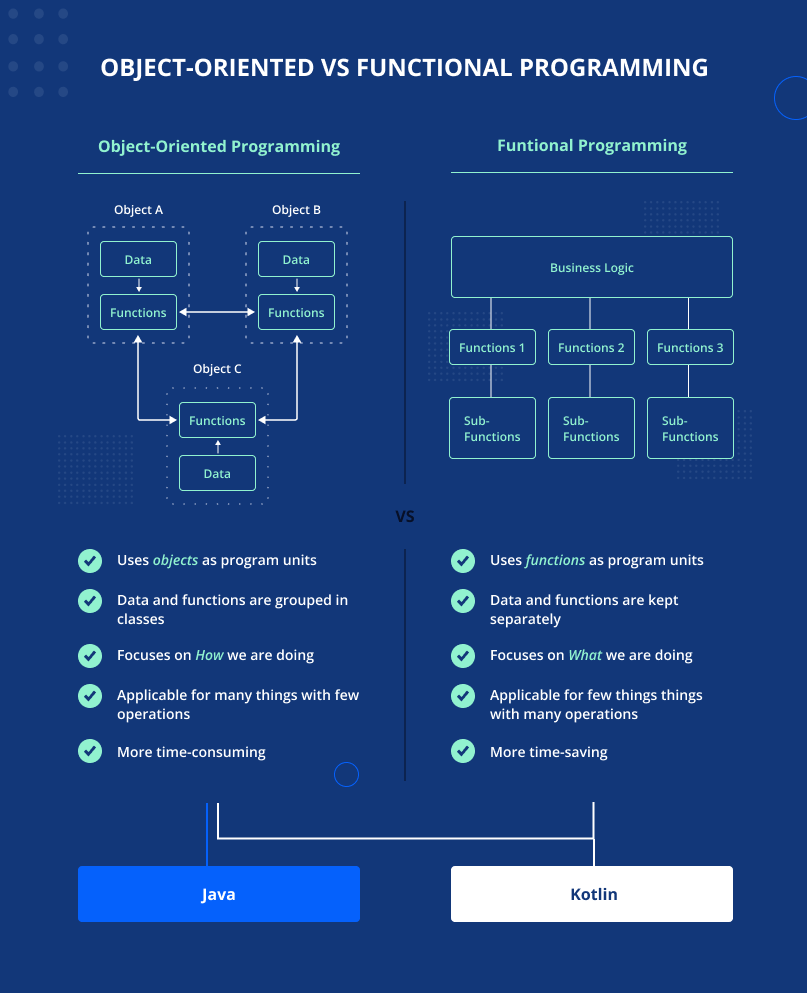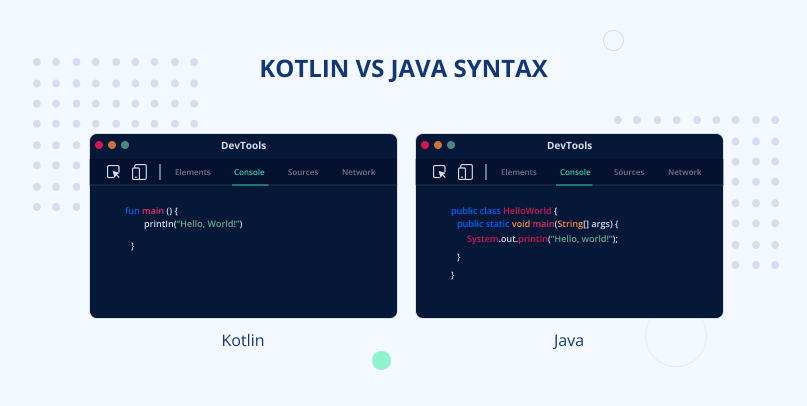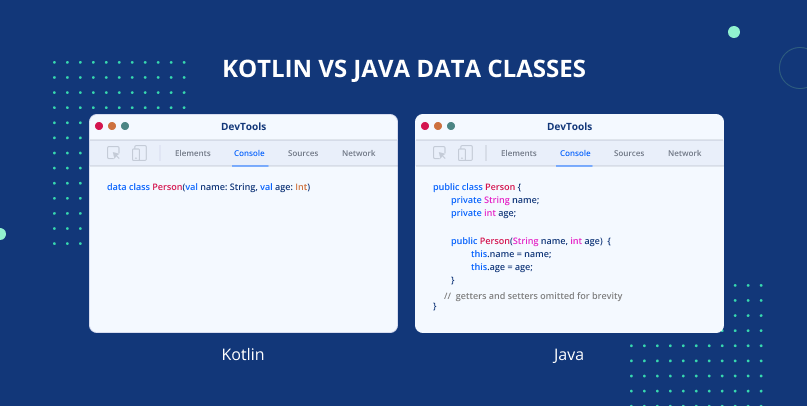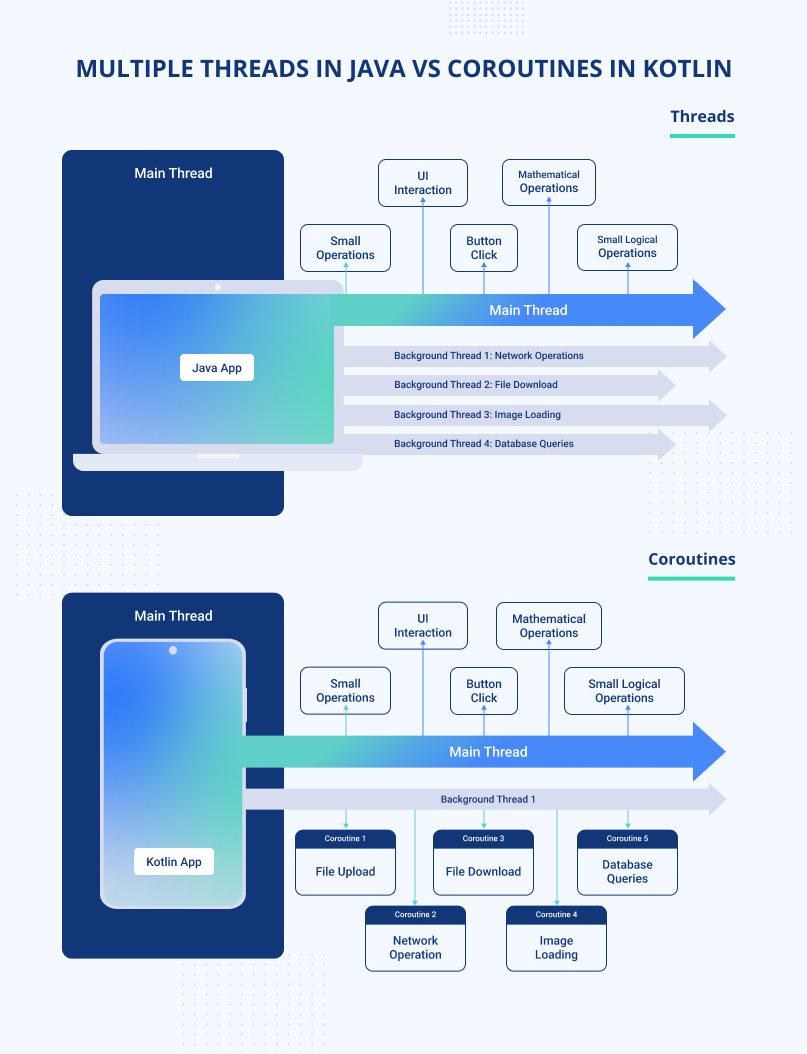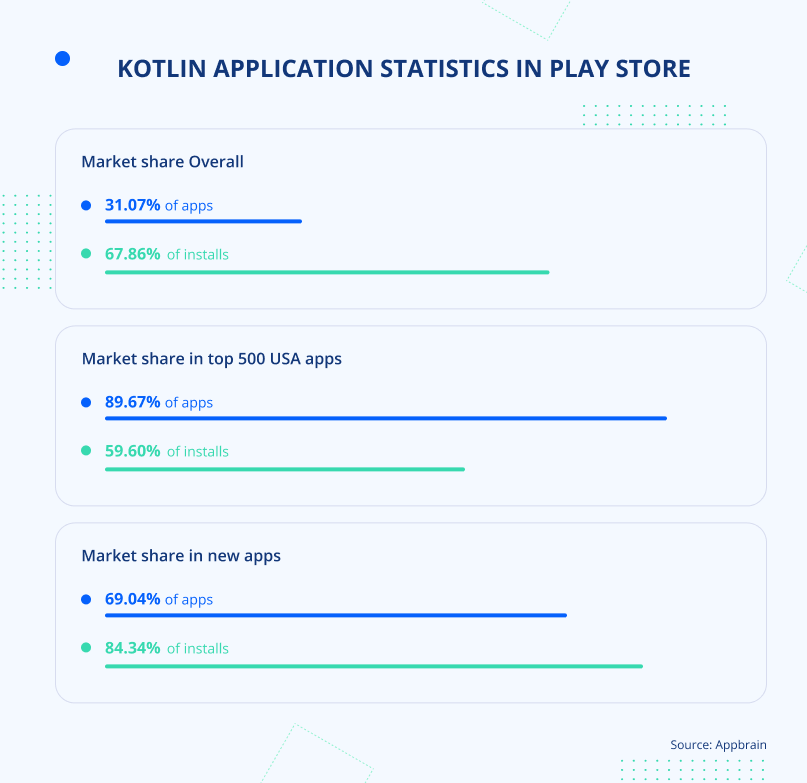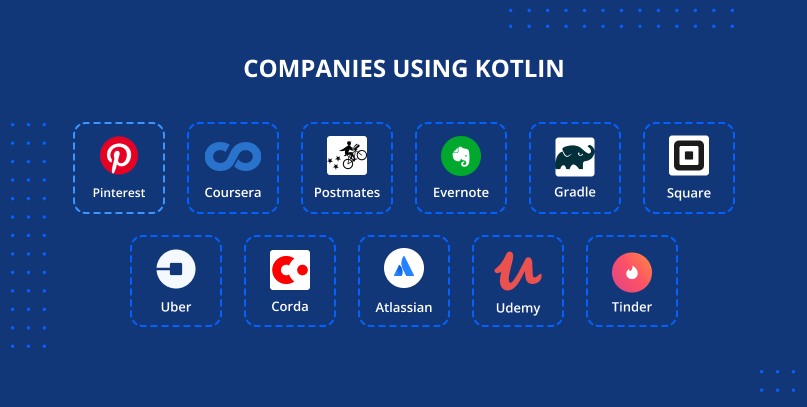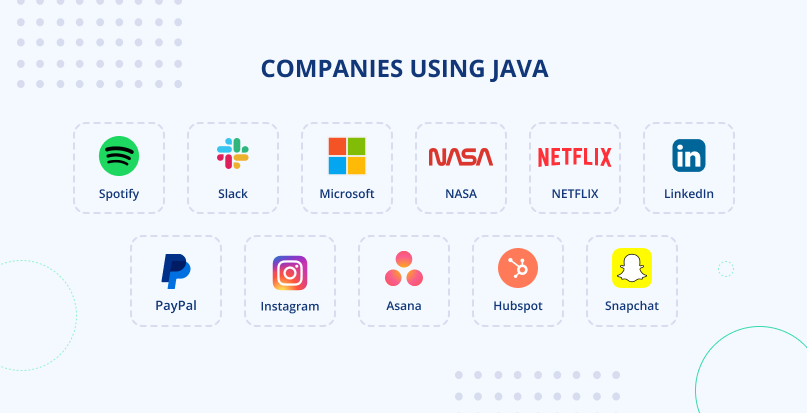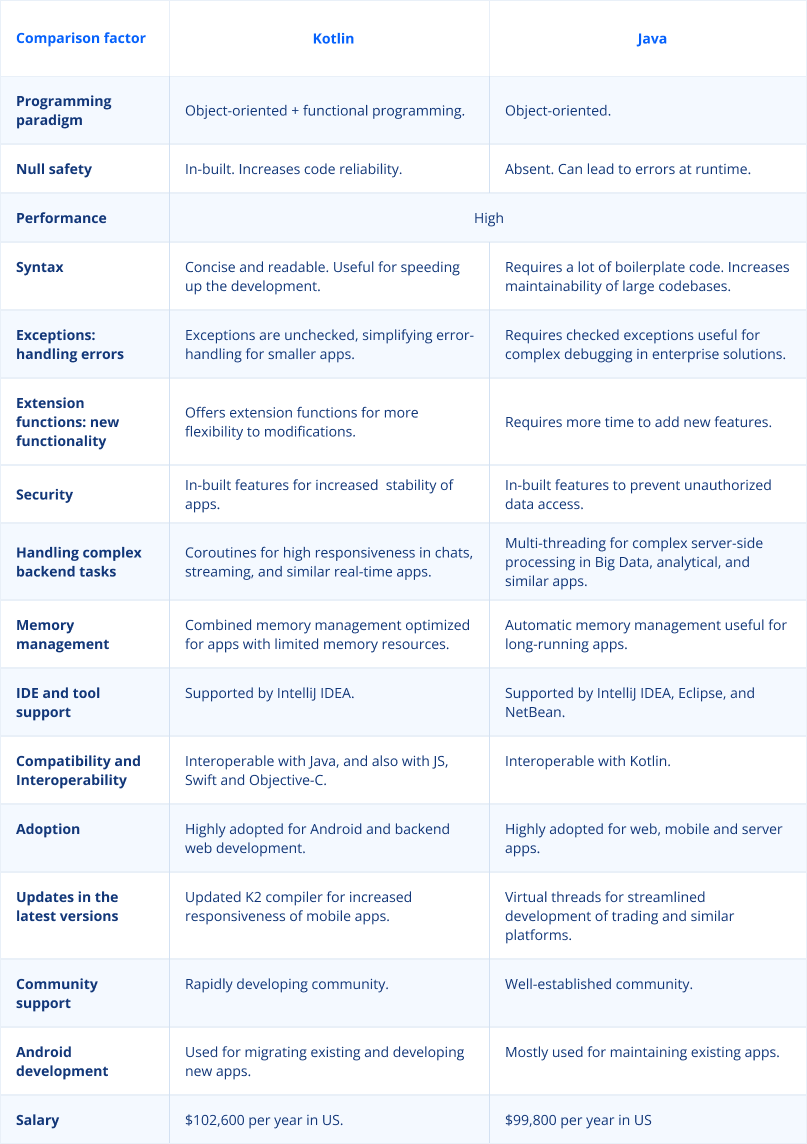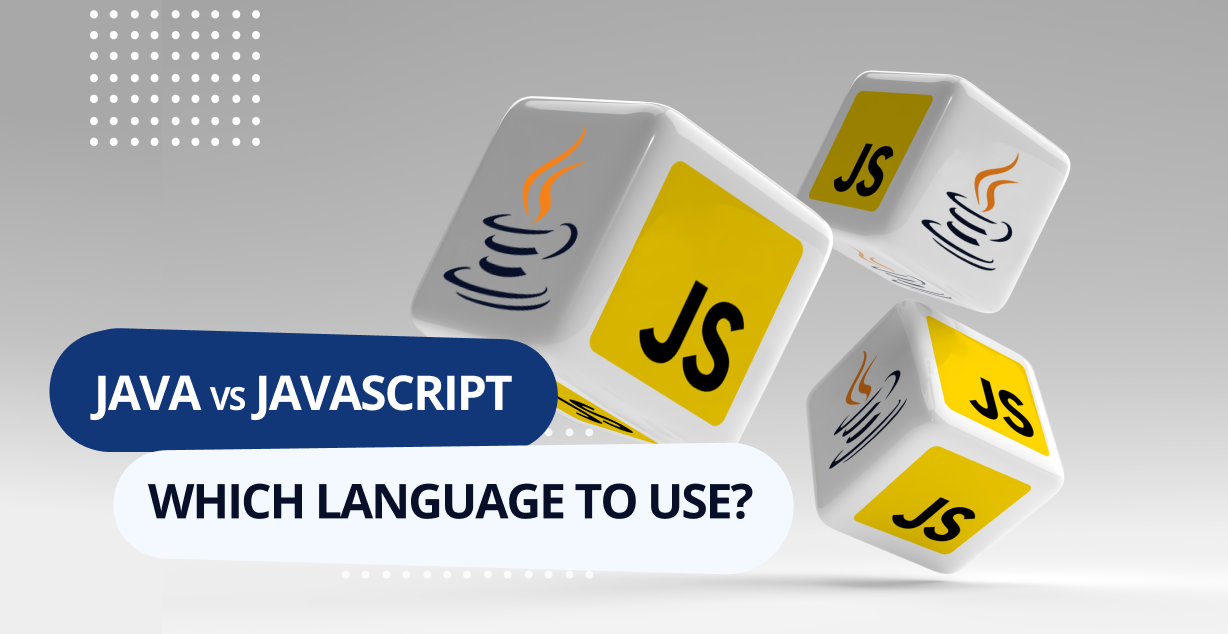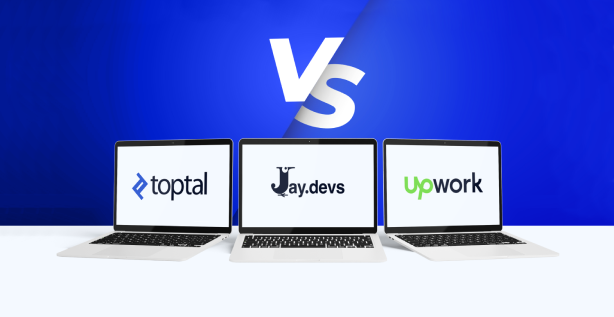Java and Kotlin are two popular programming languages widely used for developing Android applications, with Java being the long-standing standard and Kotlin emerging as its contender. Both programming languages can be used for web development and server applications, which may confuse companies when selecting a suitable technology.
Accordingly, this article will explore each tool’s strengths and use cases and break down critical differences between Kotlin and Java. This comprehensive overview will help businesses make a deliberate decision for their next project.
Expert Opinions on Java and Kotlin
Among Kotlin enthusiasts is Chet Haase, an Android graphic engineer at Google. Back in 2019, he claimed:
However, some professionals favor Java, pointing to its maturity and stability. As stated by Mauricio Lopez, CTO at Jobsity:
Others underline Java’s usage for enterprise software, emphasizing that “80% of enterprises use Java” and will keep using it for business applications.
As mentioned, Java and Kotlin can be used for server-side applications. One of our engineers gladly shared his experience-based opinion in terms of using both tools:
These differing opinions underline the use cases – while some technicians define Kotlin as a first choice for Android solutions, others claim Java is a go-to choice for enterprise projects.
Why Compare Kotlin vs Java?
Understanding each technology’s peculiarities may help choose the best-fit tool and optimize the project’s cost and timing.
A close comparison of Kotlin and Java helps define each technology’s advantages for different projects.
Programming Languages: a Brief Background
Java is a general-purpose programming language developed by Sun Microsystems in 1995. It is the 6th most used technology worldwide for a wide range of software, from web apps to enterprise solutions.
Kotlin is a relatively new programming language developed by JetBrains in 2011, with the first stable release in 2016. Now it takes 15th place among other technologies and is a popular programming language for Android development.
According to the TIOBE Index for March 2024, Java remains dominant worldwide, owing to the significant number of skilled engineers, available courses, and third-party vendors supporting it.
A History of Programming Languages
Both technologies appeared at different times and underwent several improvements that influenced their usage and adoption.
Here is а comparison of core milestones:
All these improvements highlight Java’s versatility. Starting in 2018, Java has been updated twice a year, making it a relevant tool so far.
On the other hand, Kotlin is evolving as a multiplatform language with strong support for Android development.
What is Java?
Java is an object-oriented programming language designed to be simple, portable, and secure, with the key feature of the “Write once, run anywhere” philosophy.
It introduced a simpler syntax (in comparison to C and C++) and enabled building applications to run on multiple platforms. Ultimately, Java significantly streamlined the back-end development for web, mobile, and desktop solutions.
What is Kotlin?
Kotlin programming language was designed to address the shortcomings of Java on Android, such as verbose code.
It introduced more concise and readable syntax, enabling faster app development and improved maintenance. It also resolved the runtime error issues occurring with Java, leading to more app stability.
When to Use Java?
Java has stood the test of time and remains a reliable tool for various projects.
Standout Features/Advantages of Java
Java language stands out with the following features:
- Object-oriented. Java is based on the concept of organized and reusable pieces of code. This simplifies the maintenance of complex applications.
- Platform-independent. Java code can run on any platform and suits cross-platform applications.
- High security. A built-in security system protects the code against malware, making Java a tool for sensitive data apps.
- Scalability. Java apps can handle rising workloads without compromising performance. This is particularly useful for extending solutions.
- Multi-threading. With Java, developers can create multiple threads to break down and process complex tasks occurring in Big Data, analytical, and similar apps.
Use Cases for Java
- Backend web applications for eCommerce, education, and more,
- Enterprise applications like CRM, supply chain management, and banking systems,
- Desktop applications working across Windows, Linux, and MacOS,
- Web and application servers to power cloud solutions,
- Android apps, including games and productivity apps,
- Heavy computing solutions, including Big Data, ML, and more.
Java Virtual Machine
Java Virtual Machine (JVM) is a key component that solved the problem of platform dependence and resulted in increased Java adoption.
In this, Java code is translated into machine code by a Java compiler. Once compiled, Java applications can run on any platform with a JVM installed. It does not require code changes and saves time on creating separate app versions.
When to Use Kotlin?
While Kotlin usage is usually about Android, it offers other use cases as well.
Standout Features/Advantages of Kotlin
Comparing Kotlin vs Java advantages, the former stands out with the following features:
- Support for multiple programming concepts. Kotlin combines object-oriented programming and functional programming, providing more flexibility.
- Conciseness. Kotlin’s syntax is more concise and readable, thereby reducing app development time.
- Multiplatform support. Kotlin is better for Android but can be used for iOS and frontend and backend web applications.
- Interoperability with Java. Kotlin can be easily integrated with Java to update legacy apps or build new ones on top of the existing Java code.
Use Cases for Kotlin
- Android applications, from simple utilities, such as calendar and weather apps, to chat applications,
- Cross-platform mobile apps for Android and iOS to power travel, booking, and other solutions,
- Server applications to power streaming and other platforms,
- Full-stack web applications for seamless user experience in consumer apps.
Android App Development
Kotlin has been the preferred programming language for Android since 2019. With Kotlin, engineers can write less code while achieving the same results as with Java, reducing the risk of app crashes. These peculiarities provide reduced time and costs, which made Kotlin a “new Android language” for various industries.
Kotlin vs Java: Key Differences
While Java and Kotlin have similarities, especially for Android development, they also have key differences to consider. Let’s closely examine the distinct peculiarities of each to help you choose a perfect match for your next project.
Object-oriented and Functional Programming
Both Java and Kotlin are object-oriented programming languages, while Kotlin also supports functional programming.
Object-oriented programming organizes code in objects interacting with each other. This allows for the creation of complex applications with improved scalability.
Functional programming organizes code into simpler functions operating separately. Developers often use them to simplify the programming of repetitive tasks, such as app button clicks.
Programming paradigms of Kotlin language vs Java underline that both technologies are good for scalable solutions, while Kotlin additionally provides more flexibility with a combined approach.
Null Safety
The Kotlin vs Java cheat sheet states null safety as the key difference influencing code reliability.
Java attributes null values to any variable, which may lead to errors at runtime and time-consuming debugging.
Kotlin has built-in null safety and prevents null values from being assigned, which makes code more reliable and less prone to errors by default.
This difference makes Kotlin more productive for applications where data accuracy is critical such as healthcare or navigating apps.
Performance
Performance directly impacts app loading times. When comparing Java vs Kotlin performance, it is generally similar.
Java Virtual Machine compiles and executes both languages, leading to comparable performance characteristics with minor differences.
Despite that fact, Kotlin may speed up the development of real-time applications. For example, it simplifies writing asynchronous code providing high performance in solutions with multiple user actions (networking, multimedia, and other apps).
Language Syntax and Readability
The syntax peculiarities usually impact the development speed and maintainability. Therefore, comparing Kotlin vs Java’s syntax may help you choose a more flexible tool.
Java requires writing more boilerplate code. Yet, code consistency may increase the maintainability of projects with multiple teams involved.
In contrast, Kotlin is a more readable and concise language. This allows for faster development and fewer errors, increasing project cost-effectiveness.
To create a complete picture, here are code examples of Kotlin vs Java:
Thus, Kotlin may help decrease the time-to-market, for example, for Minimal Viable Products; while Java may enhance the maintainability of large codebases in complex projects.
Exceptions
Exceptions are used to handle errors during program execution. Both languages have distinct approaches to handling that.
Java requires declaring checked exceptions with additional code.
In Kotlin, all exceptions are unchecked, yet the language provides a concise syntax for handling them, freeing up time for development.
With Java, it’s easier to fix complex error scenarios and create robust enterprise-level solutions. Kotlin may be more efficient for smaller-scale applications or rapid prototyping.
Extension Functions
Extension functions allow functionality to be added to existing classes without modifying the source code.
Kotlin offers extension capabilities, whereas Java doesn’t offer any extension function and requires more time to add features.
This difference between Java and Kotlin makes Kotlin applications more flexible in terms of modifications, which may be useful in applications with frequent updates.
Data Classes
Whether Java or Kotlin is used, your project will likely require classes that hold data.
Java requires more code for data classes, obligating developers to declare additional fields and functions.
Kotlin provides a simpler way: the developer includes the “data” keyword in a class definition, automatically generating code for common operations.
Here are the examples of data-holding classes:
Kotlin’s brevity underlines its strong focus on faster development. In contrast, the Java approach may improve inheritance — a feature that helps in building more complex data structures.
Security
Regarding Kotlin vs Java security, there are some peculiarities worth noting.
Java has built-in security features to prevent unauthorized data access, ensuring security for confidential data systems.
Kotlin provides language-level features such as null safety and immutability that enable more robust code and prevent app crashes or unexpected changes.
The security features underline Java’s focus on security-oriented projects (banking, e-commerce platforms), while Kotlin may improve stable app operation.
Multiple Threads
Multiple threads help in handling complex tasks on the backend. In this context, Kotlin vs Java speed optimization mechanisms are different.
Java allows for managing multiple background threads, providing complex server-side processing for data-heavy solutions.
Kotlin offers coroutines. Instead of threads, it enables the creation of asynchronous code to handle multiple tasks. This requires less memory and provides app responsiveness.
Comparing these Kotlin vs Java back-end capacities, Java better suits web servers and machine learning apps. At the same time, Kotlin is particularly useful for responsive mobile apps such as games and chat apps.
Memory Management Differences
Proper memory management can accelerate program execution. Among the core differences between Java and Kotlin are their memory mechanisms.
Java uses a garbage collector that automatically frees up memory, which benefits long-running apps.
Kotlin uses a combination of garbage collection and smart casts, which provides more precise control over memory allocation.
Contrasting Kotlin vs Java memory usage makes Java perfect for enterprise solutions, while Kotlin can fit limited memory resources, including mobile apps and IoT devices.
IDE and Tool Support
The availability of a robust Integrated Development Environment can improve project efficiency.
Java has a mature ecosystem with IDEs like IntelliJ IDEA, Eclipse, and NetBeans, while IntelliJ IDEA primarily supports Kotlin.
Both programming languages are well-supported in Android Studio, with Kotlin being a preferred language.
These differences make Kotlin exclusively efficient for Android development, while Java language fits for general-purpose development.
Compatibility and Interoperability
Kotlin is increasingly interoperable with Java, meaning developers can use Kotlin and Java in the same project. This also allows migrating existing Java projects to Kotlin easily.
Unlike Java, Kotlin is interoperable with JavaScript, Swift, and Objective-C, making it suitable for front-end and iOS development.
Adoption Rates of Kotlin vs Java in the Industry and Open Source Projects
The Kotlin vs Java trend emerged in 2017 when Google officially supported Kotlin for the Android platform.
When comparing the Kotlin vs Java adoption rates, it’s noteworthy that Kotlin enjoys robust community support and widespread usage worldwide. Notably, over 95% of the top thousand Android apps utilize Kotlin. Additionally, many startups and Fortune 500 companies have embraced Kotlin for Android app development, as evidenced by the list available on Google’s website for Android developers.
Ultimately, the difference in Kotlin vs Java demand is reflected in steady Java usage for web, mobile, and server apps and the growing adoption of Kotlin for mobile and backend web development.
Features and Updates Introduced in the Latest Versions
Changes to the latest versions may help fully understand the potential of Kotlin vs Java in 2024.
More specifically, Java’s latest feature, virtual threads, streamlines the development and maintenance of applications with simultaneous user events.
Kotlin, on the other hand, took care of improving the K2 compiler to improve app performance and reduce memory usage.
Java 22 introduces 12 notable enhancements, each significant enough to merit its own JDK Enhancement Proposal (JEP). These include seven preview features and one incubator feature, spanning improvements to the Java Language, its APIs, performance, and JDK tools.
Conversely, Kotlin enhances interoperability between Kotlin/Wasm and JavaScript. Notably, it enables the use of unsigned primitive types within external declarations and functions, facilitated by the @JsExport annotation, which makes Kotlin/Wasm functions accessible in JavaScript code.
Community Support
When comparing Kotlin vs Java’s popularity among developers, Java has a more well-established community. The language has been around since 1995 and now offers many tutorials, videos, and forums.
Kotlin, on the other hand, has a relatively smaller community, but it is rapidly growing and becoming increasingly popular.
Extensive Java community support enables developers to easily find solutions to any issues, while the growing Kotlin community is a valuable resource for implementing trending features.
Android Development
In the context of Kotlin vs Java for Android app development, Kotlin has pulled ahead.
In 2019, Google announced the “Kotlin-first approach” for Android, which means new development tools are designed “with Kotlin users in mind.” It is increasingly used by Android developers and businesses as well. In fact, companies like Pinterest and Uber migrated their apps from Java to Kotlin.
Nonetheless, Java remains the official language of Android. Many existing apps, including Spotify and Twitter, still use Java as their primary technology.
From the perspective of Java vs Kotlin in Android projects, Kotlin seems more efficient and promising.
Kotlin vs Java Developer Salary
There is no huge difference between the salaries of Java developers and Kotlin developers.
According to Glassdoor, the average Java developer salary in the US is around $103,037 yearly, while Kotlin developers make around $107,583.
However, the Kotlin vs Java job market differs. There are about 40,535 Java vacancies on Indeed.com, while 2,045 companies are looking for Kotlin developers.
Given the increasing popularity of Kotlin, this may result in higher demand and potentially higher salaries for Kotlin engineers.
Kotlin vs Java: Summary of Differences
To simplify the key differences, here is a head-to-head comparison of Java versus Kotlin:
Which is Better for Android Development: Kotlin or Java?
Kotlin was designed to address some of the Java pain points, making it more concise, safer, and efficient for Android apps.
Kotlin provides more responsiveness for real-time applications (chats, games, navigators), offering a better experience for mobile users. It also has prebuilt features to prevent mobile apps from crashing.
Being a concise language, Kotlin increases the developer’s productivity due to its simpler syntax and leads to rapid prototyping for Android development.
When choosing Kotlin or Java for Android, the former provides more time and cost optimizations, making it a preferred tool.
Conclusion
In this article, we considered the benefits of Kotlin vs Java for various projects.
As we compared Kotlin vs Java for mobile development, Kotlin displayed a promising alternative by offering faster development. It is also extensively used for:
- Utilities (e.g., weather apps) and complex Android apps (e.g., chat apps),
- Server applications to power streaming and other platforms,
- Cross-platform mobile apps,
- Full-stack consumer web applications.
Java is a stalwart tool for developing complex applications, offering stability and scalability. It is used for:
- Backend web apps with complex business logic,
- Enterprise solutions (CRM, HRM, banking systems),
- Web and application servers to power cloud solutions,
- Android apps,
- Heavy data apps such as ML, analytics, and BigData.
Whether you choose Kotlin or Java, we offer dedicated middle, senior, and lead engineers to kickstart your project. Contact us to get more information on their availability.





